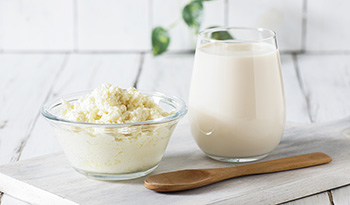Pufrovaný vitamín C s bioflavonoidmi: Výkon pre imunitu

Vitamín C je jednou z najskúmanejších a najznámejších živín pre imunitné zdravie, napriek tomu si mnohí ľudia neuvedomujú, že forma a kvalita ich doplnku vitamínu C môže významne ovplyvniť účinnosť aj znášanlivosť. Aj keď tento základný vitamín hrá kľúčovú úlohu v celom tele, od podpory imunitnej funkcie až po podporu syntézy kolagénu, správna formulácia môže zvýšiť vstrebávanie a zároveň je šetrná voči citlivým žalúdkom.
Výhody vitamínu C
Vitamín C, tiež známy ako askorbát alebo kyselina askorbová, funguje ako silný vo vode rozpustný antioxidant, ktorý vaše telo nemôže samo produkovať. To znamená, že ho musíte dostať prostredníctvom stravy alebo doplnkov. Vitamín C je nevyhnutný pre mnohé telesné funkcie, takže primeraný príjem je rozhodujúci pre celkové zdravie.4
Imunitná podpora
Vitamín C podporuje váš imunitný systém tým, že pomáha kľúčovým bunkám pracovať efektívnejšie. Posilňuje okamžitý aj dlhodobý imunitný systém. Podľa výskumu uverejneného v časopise Nutrientsvitamín C posilňuje kožnú bariéru, aby blokoval škodlivé patogény a pomáha pokožke odstraňovať škodlivé voľné radikály. Hromadí sa tiež v imunitných bunkách, ako sú neutrofily, kde zlepšuje ich schopnosť presúvať sa na miesta infekcie, zachytávať škodlivé mikróby a ničiť ich.1
Tvorba kolagénu
Okrem užívania vitamínu C na podporu imunity slúži vitamín C ako kofaktor pri syntéze kolagénu, čo je proces nevyhnutný pre udržanie zdravej pokožky, krvných ciev, kostí a spojivového tkaniva.2
Podporuje mozgové chemikálie a absorpciu železa
Vitamín C tiež hrá dôležitú úlohu pri syntéze neurotransmiterov a pomáha zlepšovať vstrebávanie železa z rastlinných potravín.3
Buffered vs. Štandardný vitamín C: Pochopenie rozdielu
Tradičné doplnky vitamínu C obsahujú kyselinu askorbovú v čistej forme, ktorá môže byť pre niektorých ľudí ťažká pre tráviaci systém. Kyslá povaha štandardného vitamínu C môže spôsobiť žalúdočné ťažkosti, pálenie záhy alebo tráviace ťažkosti, najmä ak sa užíva nalačno alebo vo vyšších dávkach. Toto obmedzenie viedlo mnohých ľudí k tomu, aby sa vyhli suplementácii vitamínu C napriek jeho potenciálnym výhodám.
Pufrovaný vitamín C pre citlivé žalúdky rieši tento problém kombináciou kyseliny askorbovej s minerálnymi soľami, ako je vápnik, horčík alebo askorbát sodný. Tento pufrovací proces neutralizuje kyslosť pri zachovaní biologickej aktivity vitamínu.
Proces pufrovania vytvára pH neutrálny doplnok, ktorý uvoľňuje vitamín C postupne a potenciálne rozširuje jeho prítomnosť v krvnom obehu.5
Výhody pufrovaných formulácií
Výhody pufrovaného vitamínu C presahujú tráviaci komfort. Tieto formulácie často poskytujú ďalšie minerály, ktoré podporujú celkové zdravie.
- Neutralizované pH v pufrovaných alebo jemných receptúrach vitamínu C znižuje pravdepodobnosť pálenia záhy alebo žalúdočnej nevoľnosti.
- Askorbát vápenatý vám poskytuje vitamín C plus vápnik pre silné kosti a stabilné nervy. Askorbát horečnatý pridáva horčík, ktorý pomáha vašim svalom relaxovať a vaše nervy správne fungovať.
- Dávku môžete bezpečne zvýšiť počas silného stresu, cestovania alebo chladného obdobia bez žalúdočnej nevoľnosti, ktorú niektorí ľudia cítia s obyčajným vitamínom C.
Sila bioflavonoidov a šípok
Kombinované formulácie vitamínu C môžu zvýšiť jeho výhody.
Vitamín C s bioflavonoidmi
Bioflavonoidy sú prírodné zlúčeniny nachádzajúce sa v rastlinách, najmä v citrusových plodoch, bobuľách a iných potravinách bohatých na vitamín C. Podľa výskumu uverejneného v časopise Molecules môžu bioflavonoidy pomôcť vášmu telu absorbovať a používať vitamín C efektívnejšie. Ponúkajú tiež svoje vlastné antioxidačné výhody. Pomáhaním stabilizovať vitamín C môžu bioflavonoidy predĺžiť jeho aktívnosť v tele a zlepšiť jeho skladovanie v tkanivách. Niektoré bežné bioflavonoidy vo vysokokvalitných doplnkoch zahŕňajú hesperidín, rutín a kvercetín.6
Vitamín C so šípkami
Šípky, plody rastliny ruží, obsahujú prirodzene sa vyskytujúci vitamín C spolu s bioflavonoidmi, karotenoidmi a ďalšími prospešnými zlúčeninami. Tradičné používanie šípok na podporu imunity bolo potvrdené moderným výskumom, ktorý ukazuje ich antioxidačné a protizápalové vlastnosti. Štúdie ukazujú, že šípky majú protizápalové a antioxidačné účinky, ktoré môžu zvýšiť silu doplnkov vitamínu C.7
Synergické účinky kombinovaných formulácií
Kombinácia vitamínu C, bioflavonoidov a šípok vytvára antioxidačný vzorec, ktorý môže poskytnúť výhody v porovnaní s izolovaným vitamínom C. Táto kombinácia môže zvýšiť syntézu kolagénu účinnejšie ako samotný vitamín C a podporuje nielen imunitné funkcie, ale aj zdravie pokožky a hojenie rán.
Bioflavonoidy majú tiež svoje vlastné imunomodulačné vlastnosti, vrátane schopnosti podporovať zdravé zápalové reakcie a zvyšovať aktivitu imunitných buniek. Štúdia z roku 2023 zistila, že kombinácia vitamínu C so šípkami a bioflavonoidmi zlepšuje antioxidačnú aktivitu a znižuje zápal viac ako samotný vitamín C.7, 8
Rôzne formáty doplnkov pre každý životný štýl
Moderné doplnky vitamínu C prichádzajú v rôznych formách, aby vyhovovali rôznym preferenciám a životnému štýlu. Pochopenie výhod každého formátu vám pomôže vybrať si možnosť, ktorá najlepšie vyhovuje vašej rutine a potrebám. Vyberte formát, ktorý vám vyhovuje.
Tablety alebo kapsuly
- Výhody: Presné dávkovanie, dlhá trvanlivosť, ľahké cestovanie. Tablety s predĺženým uvoľňovaním udržujú hladiny v krvi stabilné.
- Najlepšie pre: Každý, kto chce maximálne miligramov alebo pridané doplnky (bioflavonoidy, šípky).
Kapsuly (rýchlo sa rozpúšťajú)
- Výhody: Žiadna chuť, ľahšie sa prehĺta ako tablety, rýchla absorpcia.
- Najlepšie pre: Tých, ktorí nemajú radi veľké pilulky alebo potrebujú rýchle užívanie.
Gumy
- Plusy: Chutné, bez piluliek, vhodné pre deti
- Najlepšie pre: Tých, ktorí nemajú radi veľké pilulky alebo potrebujú rýchle užívanie
Prášky
- Výhody: Flexibilné dávkovanie; zmiešajte do vody, smoothies alebo jogurtu.
- Najlepšie pre: Úprava príjmu pre tréning, cestovanie alebo zvýšenie chladného obdobia.
Vyberte formulár, ktorý budete mať každý deň. Napríklad ani tie najlepšie tablety vitamínu C nepomôžu, ak ich nebudete užívať.
Čo robí kvalitný doplnok vitamínu C?
Výber najlepšieho doplnku vitamínu C pre dennú imunitu si vyžaduje pochopenie kľúčových faktorov, ktoré odlišujú vynikajúce produkty od základných formulácií. K kvalite, účinnosti a bezpečnosti doplnkov prispieva niekoľko faktorov.
Testovanie a čistota tretích strán
Kvalitné doplnky vitamínu C podliehajú testovaniu tretích strán na overenie účinnosti, čistoty a neprítomnosti kontaminantov. Toto nezávislé overenie zabezpečuje, že výrobok obsahuje uvedené množstvo vitamínu C a spĺňa bezpečnostné normy pre ťažké kovy, mikroorganizmy a iné potenciálne kontaminanty.9
Tablety vitamínu C, ktoré nie sú geneticky modifikované, oslovia ľudí, ktorí hľadajú doplnky vyrobené bez geneticky modifikovaných zložiek.4 To naznačuje, že zdroj vitamínu C a ďalšie zložky spĺňajú štandardy, ktoré nie sú GMO a sú v súlade s preferenciami pre prirodzenejšie doplnky.6
Výrobné štandardy a certifikácie
Hľadajte doplnky vyrobené v zariadeniach, ktoré dodržiavajú dobré výrobné postupy (GMP), ktoré zabezpečujú konzistentné štandardy kvality a bezpečnosti. Tieto zariadenia podliehajú pravidelným kontrolám a udržiavajú prísne protokoly pre manipuláciu so zložkami, výrobné procesy a kontrolu kvality.12
Certifikácie od organizácií, ako je United States Pharmacopeia (USP), poskytujú dodatočné zabezpečenie kvality a bezpečnosti. Tieto certifikácie tretích strán overujú, či doplnky spĺňajú špecifické normy pre čistotu, účinnosť a kvalitu výroby.13
Optimálne dávkovanie a biologická dostupnosť
Väčšina dospelých dostane najlepšiu imunitu od 500 do 1 000 mg vitamínu C denne. Prekročenie bezpečnej hornej hranice 2 000 mg môže spôsobiť žalúdočné ťažkosti. Receptúry, ktoré pridávajú bioflavonoidy alebo pufrované formy, pomáhajú vášmu telu absorbovať a používať vitamín C efektívnejšie, takže získate viac výhod s menším počtom vedľajších účinkov.
Veda za každodennou imunitnou podporou
Pravidelné užívanie vitamínu C pomáha podporovať váš imunitný systém, najmä v obdobiach vysokého stresu alebo sezónnych zmien. Táto základná živina hrá kľúčovú úlohu pri udržiavaní zdravia a funkcie imunitných buniek.
Boj proti bežnému nachladnutiu
Vitamín C nemusí zabrániť ochoreniu, ale môže pomôcť skrátiť trvanie príznakov a znížiť ich závažnosť. Štúdia z roku 2023 zistila, že suplementácia vitamínu C skrátila trvanie príznakov bežného nachladnutia o 8 až 14% a znížila skóre závažnosti u dospelých aj detí.10
Robí to podporou funkcie bielych krviniek, zvýšením produkcie protilátok a podporou zdravej zápalovej odpovede. Tieto akcie pomáhajú telu lepšie bojovať proti infekciám, vďaka čomu je pravidelná suplementácia praktickým spôsobom podpory imunitného systému počas celého roka.10
Stresová reakcia a imunitná funkcia
Stres môže oslabiť váš imunitný systém. Dlhodobý stres zvyšuje kortizol a vytvára ďalšie voľné radikály, ktoré znižujú obranyschopnosť vášho tela. Vitamín C podporuje nadobličky a pomáha vám vyrovnať sa, takže jeho dostatok každý deň udrží imunitné bunky pripravené aj vtedy, keď sa cítite pod tlakom.1,6
Výskum ukazuje, že vitamín C podporuje nadobličky a pomáha znižovať negatívne účinky stresu na imunitu. Užívanie denného doplnku imunitnej podpory môže pomôcť udržať stabilnú hladinu vitamínu C.11
Tipy na výber dennej podpory imunity
Výber správneho doplnku vitamínu C zahŕňa zváženie vašich individuálnych potrieb, zdravotného stavu a faktorov životného štýlu:
- Chýba vám ovocie a zelenina vo vašej strave alebo máte vysoký stresový životný štýl? Vyberte 500 - 1 000 mg denne. Máte citlivý žalúdok? Vyberte pufrovanú formu (askorbát vápenatý alebo horečnatý).
- Počas mesiacov nachladnutia a chrípky môže väčšiu podporu ponúknuť silnejšia dávka plus doplnky, ako sú bioflavonoidy alebo šípky.
- Vytvorenie rutiny je dôležité. Užívanie doplnkov denne udržuje hladinu krvi stabilnú.
- Vyhľadajte testovanie tretích strán (USP, NSF), celé množstvá zložiek a tvrdenia, ktoré nie sú GMO alebo GMP. Receptúry, ktoré spájajú pufrovaný „vitamín C s bioflavonoidmi“, často poskytujú lepšiu hodnotu a účinnosť.
- Či už ide o tablety vitamínu C podporujúce imunitu, gumy alebo kapsuly, najlepší doplnok je ten, ktorý budete neustále užívať.
Držte sa produktu, ktorý vyhovuje vášmu životnému štýlu. Je pravdepodobnejšie, že to budete brať dôsledne, čo je to, čo skutočne podporuje imunitné výhody.
Podpora vašej wellness cesty
Užívanie vitamínu C je skvelý spôsob, ako podporiť váš imunitný systém, ale je to len jeden kus skladačky. Doplnky fungujú najlepšie v kombinácii s inými zdravými návykami, ako je dobré stravovanie, dostatok spánku, zostať aktívny a zvládať stres. Vyhľadajte čisté a účinné možnosti vitamínu C, ktoré zapadajú do vašej každodennej rutiny a pomôžu vám zostať v poriadku každý deň.
Referencie:
- Carr, AC a Maggini, S. (2017). Vitamín C a imunitná funkcia. Živiny, 9 (11), 1211.https://www.ncbi.nlm.nih.gov/pmc/articles/PMC5707683/
- Boo YC. Kyselina askorbová (vitamín C) ako kozmetický prostriedok na zvýšenie dermálneho kolagénu na účely proti starnutiu pokožky: Nové kombinované terapie. Antioxidanty (Bazilej). 2022 26. augusta; 11 (9): 1663. https://pmc.ncbi.nlm.nih.gov/articles/PMC9495646/
- Lynch SR, Cook J. D. Interakcia vitamínu C a železa. Ann NY Acad Science 1980; 355:32-44. https://pubmed.ncbi.nlm.nih.gov/6940487/
- Národné ústavy zdravia, Úrad doplnkov stravy. (2023). Vitamín C: Informačný list pre zdravotníckych pracovníkov. Zdroj: https://ods.od.nih.gov/factsheets/VitaminC-HealthProfessional/
- Dickerson B, Gonzalez DE, Sowinski R, Xing D, Leonard M, Kendra J, Jenkins V, Gopalakrishnan S, Yoo C, Ko J, Pillai SS, Bhamore JR, Patil BS, Wright GA, Rasmussen CJ, Kreider RB. Porovnávacia účinnosť kyseliny askorbovej vs. Požitie askorbátu vápenatého na farmakokinetických profiloch a imunitných biomarkeroch u zdravých dospelých: predbežná štúdia. Živiny. 2024 2. októbra; 16 (19): 3358. https://pmc.ncbi.nlm.nih.gov/articles/PMC11479081/
- Gupta A, Al-Aubaidy HA, Narkowicz CK, Jelinek HF, Nichols DS, Burgess JR, Jacobson GA. Analýza obsahu citrusových bioflavonoidov a inhibičného potenciálu dipeptidylpeptidázy-4 komerčne dostupných doplnkov. Molekuly. 2022 25. júla; 27 (15) :4741. https://pmc.ncbi.nlm.nih.gov/articles/PMC9332104
- Safe S, Jayaraman A, Chapkin RS, Howard M, Mohankumar K, Shrestha R. Flavonoidy: štruktúra-funkcia a mechanizmy pôsobenia a príležitosti na vývoj liekov. Toxicol Res. 2021 20. januára; 37 (2): 147-162. https://pmc.ncbi.nlm.nih.gov/articles/PMC8007671/
- Ayati Z, Amiri MS, Ramezani M, Delshad E, Sahebkar A, Emami SA. Fytochémia, tradičné použitie a farmakologický profil šípky: prehľad. Curr Pharm December 2018; 24 (35) :4101-4124. https://pubmed.ncbi.nlm.nih.gov/30317989/
- Nowak D, Gośliński M, Wojtowicz E, Przygoński K. Antioxidačné vlastnosti a fenolové zlúčeniny štiav bohatých na vitamín C. J Food Science. 2018 august; 83 (8): 2237-2246. doi: 10.1111/1750-3841.14284. Epub 2018 25. júl. PMID: 30044505. https://pubmed.ncbi.nlm.nih.gov/30044505/
- Farmakopeia Spojených štátov. (2023). Doplnky overené USP. Zdroj: https://www.usp.org/verification-services/verified-supplements
- Hemilä H, Chalker E. Vitamín C znižuje závažnosť bežných prechladnutí: metaanalýza. Verejné zdravie BMC. 2023 11. decembra; 23 (1): 2468. https://pubmed.ncbi.nlm.nih.gov/38082300/
- Moritz B, Schmitz AE, Rodrigues ALS, Dafre AL, poslanec Cunha. Úloha vitamínu C pri poruchách súvisiacich so stresom. J Nutr Biochem. 2020 november; 85:108459. doi: 10.1016/j.jnutbio.2020.108459. Epub 2020 3. júl. PMID: 32745879. https://pubmed.ncbi.nlm.nih.gov/32745879/
- Americký úrad pre potraviny a liečivá. (2023). Súčasné predpisy o správnej výrobnej praxi (CGMP). Zdroj: https://www.fda.gov/drugs/pharmaceutical-quality-resources/current-good-manufacturing-practice-cgmp-regulations
VYHLÁSENIE: Toto Centrum zdravia a pohody neposkytuje diagnózu,...
















































































 Obsah
Obsah














